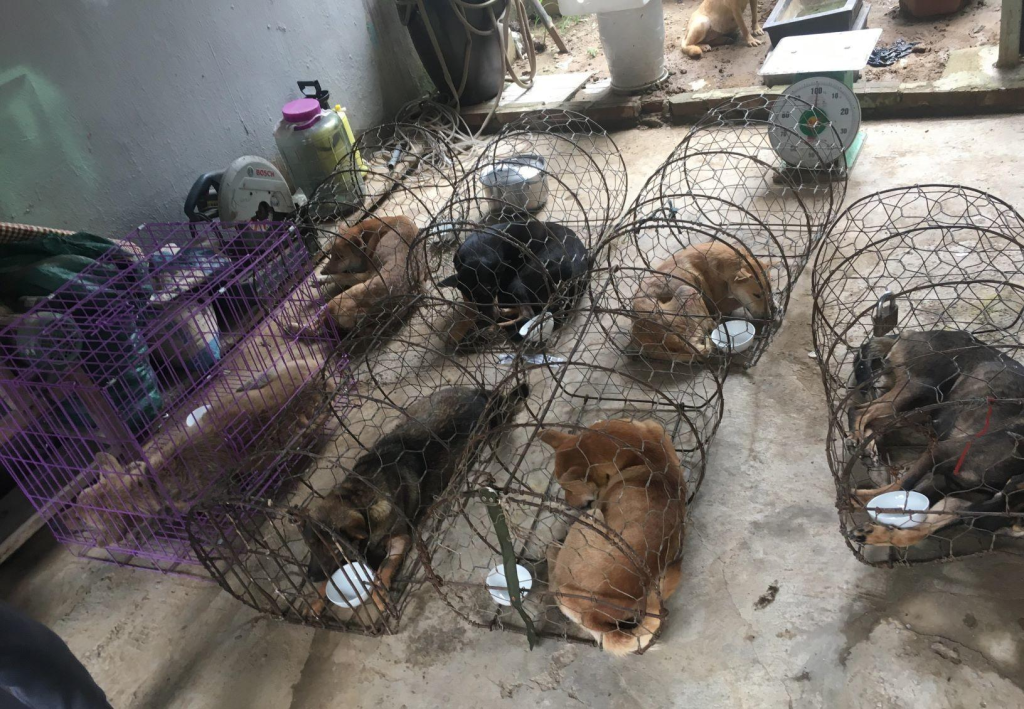
Dr. Katherine Polak, Head of Stray Animal Care Southeast Asia for FOUR PAWS
The dog meat trade is big business in Vietnam and threatens the lives of millions of dogs every year, many of them pets. Every day, pets are violently snatched off the streets, from yards, and even while out on a walk with their owners. These unlucky dogs make a brutal journey to slaughterhouses, markets, and restaurants, where a gruesome death awaits them. But times are changing, and the brutality and illegality of pet theft is no longer being tolerated by Vietnamese authorities.
In a landmark case, police in Thanh Hoa Province received a tip off regarding a gang of dog thieves believed to have stolen thousands of dogs since the beginning of the year. On September 15, 2019 the police successfully carried out the largest ever bust of a dog theft ring in Vietnam, resulting in the seizure of 51 dogs. According to the police, the gang carried stun guns and other sharp weapons, and rode motorbikes through residential areas late at night shooting dogs roaming outside. Police arrested a total of 16 suspected gang members and questioned more than 40 suspects. The gang not only brutalized neighborhood dogs, but also caused outrage among local people, particularly pet owners.
Following the interception, Police struggled to properly care for the confiscated dogs given their limited capacity for animal care, so the Asia Canine Protection Alliance (ACPA), of which FOUR PAWS is a member, stepped in to offer assistance. There were 13 dogs in need of immediate medical care due to severe wounds sustained during capture. Dogs with painful open wounds were anaesthetised, treated, provided pain medication and antibiotics, and housed in a temporary shelter for ongoing treatment.
The Asia Canine Protection Alliance is an international alliance of four animal protection organizations committed to ending the illegal trade of dogs in Vietnam: FOUR PAWS, Animals Asia, Humane Society International, and Change for Animals Foundation. ACPA is working to build collaborative relationships with the governments throughout Southeast Asia where the dog meat trade is prevalent, and has already secured a moratorium on the trade in dogs between Thailand and Vietnam.
Following the confiscation, the police publicised the bust throughout the province using local media so that stolen dogs could be reunited with their families.
Over the course of 2 weeks, all 51 dogs were successful reunited with their owners, who were devastated by their pets’ disappearance.
This bust pets a major precedent as dog theft is rarely treated as a criminal offense in Vietnam unless the canines are valued at more than VND2 million ($86).
“These arrests will hopefully go a long way in deterring future dog theft in Thanh Hoa Province, and potentially throughout all of Vietnam. While the dog meat trade is often defended as ‘culture’ or ‘tradition’, the reality is that there are significant health and societal impacts associated with the trade and these are becoming of ever-growing concern within Vietnam and internationally.”

Earlier in the week, the Food Safety Management Board of Ho Chi Minh City urged locals to stop eating dog meat in an effort to improve Vietnam’s national image with tourists. They also warned the local community of the health risks posed by consuming the unregulated meat. This followed a similar call by the Hanoi People’s Committee last year.
In addition to membership in ACPA, FOUR PAWS also runs a ‘Cats Matter Too program‘ in Central Vietnam with local charities PAWS for Compassion and Vietnam Cat Welfare to improve veterinary training, animal welfare education, and provide free spay/neuter services.
Dedicated Father: Golden Retriever Displays Remarkable Commitment in Caring for His Pregnant Mate.
For dads, do you recall how you took care of your wife while she was pregnant?
Of course, you do. You could have recalled those moments when you conducted errands while being the only one who was in charge of the house and all the chores. Well, you’re not alone.
While some spouses will say that they weren’t as lucky, they can always display this viral film of how a golden retriever took care of his mate while in delivery.
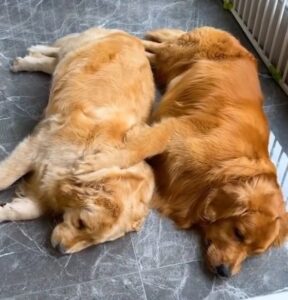
These Goldens went viral. At first, they were seen sleeping next each other. Then, the instant the wife woke up, the dog rushed for the AC switch and upped the temperature.
Next, he snatches a tiny basin with his mouth and trots to the kitchen. He set the basin down in the sink and stretched his paw to turn on the faucet. He then gladly marched to his mate, quite happy with himself.
Once she finished her drink, he went to retrieve her leash. As a pregnant dog, exercise is still vital so she may keep fit. But instead of their owner taking both of them to the park, the dog chewed on the leash and joined his mate.
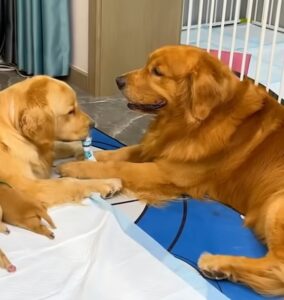
This provided the daddy dog an opportunity to conduct other errands. Throughout this section of the day, he went into the kitchen to assist prepare his mate’s dinner.
Chicken, fish, shrimp, and some veggies seem excellent. Daddy dog assisted his human with cleaning. He even took out the garbage.
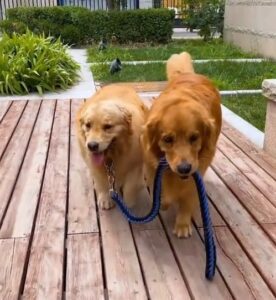
He’s even a gentleman during dinner. He could be incredibly hungry with all his effort, but he lets his mate get her fill first. After all, she’s also eating for their pups.
Later, when he invited her for a post-dinner run, something occurred. His wife urged to remain home.
Then, the labor began. As their fur parents sensed what was about to happen, they swiftly prepared up a nest for her. What was a room only for the two of them became a home for a loving family.
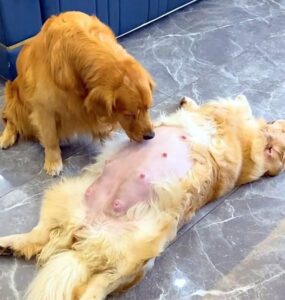
One by one, the puppies emerged from their mother. The owners cleaned them well before leaving them to breastfeed on their mother.
All the while, they were feeding her readily digested meals to aid her through the procedure.
The adorable retriever eventually became daddy. They ended up with seven healthy pups. They all have their unique colorful collars that nearly resemble a rainbow.
And just like that, the daddy dog is on the chores again. But this time, he wasn’t simply taking care of one dog. He’s watching over his mate and their children.

With the reliability that this “goodest” youngster displayed, though, we know they’ll be okay.
See this doting golden retriever take care of his complete family in the video below!
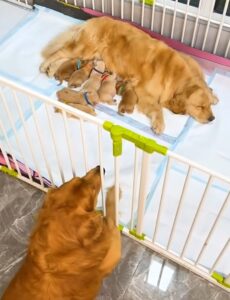
Kindly SHARE this with your friends and family.
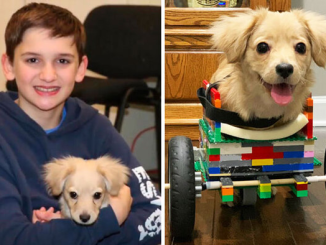

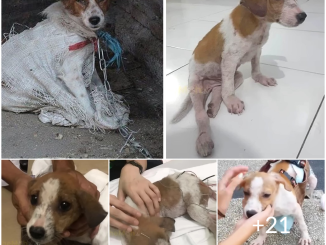
Leave a Reply